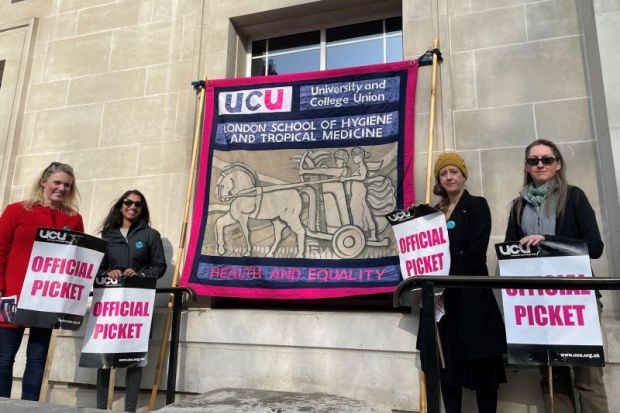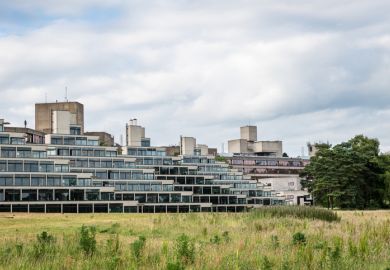As a third wave of strike action began at UK universities, staff on the picket lines insisted that they were determined to fight on despite controversial pension cuts being forced through.
The University and College Union says that 50,000 staff are eligible to take part in the latest industrial action and that 1 million students could be affected, with 38 institutions out this week and a further 29 to follow on 28 March.
It is the third walkout of this academic year, after similar strikes a month ago and in December 2021. Staff are striking over pay and working conditions or pension cuts, and most branches have a mandate to take action in both disputes.
Those on the picket lines admitted to being affected by fatigue but said frustrations at the lack of progress and at vice-chancellors forcing through cuts to the Universities Superannuation Scheme (USS) have forced them to down tools once again.
Outside the London School of Hygiene and Tropical Medicine, research fellow and local UCU branch chair Shari Krishnaratne told Times Higher Education that she was “disappointed” to be back on strike.
“We were hoping it wouldn’t come to this, but the USS vote was really demoralising,” she said. “It seemed liked a closed conversation before it had even started. I think we are being heard, but the message is not being taken up for whatever reason.”
Ms Krishnaratne said that as well as pensions, she was concerned about the impact of casualisation on higher education. None of the four staff members on the picket line on 21 March was on a permanent contract, and she personally had been in post for 10 years with little job security. Ms Krishnaratne added that staff have worked longer hours and given up holidays because of the school’s pivotal role during the pandemic but many still don’t know if they will be working there from one year to the next.
“People that are here love the school. We think it is such a great institution and produces such great work,” she said. “But I don’t think there’s anybody here who hasn’t had the experience of trying to piece together grants and covering gaps between funding.”
The latest strikes are taking place as UCU members are balloted over further potential industrial action that could coincide with the exams and marking period.
Amid claims from the Universities and Colleges Employers Association that previous actions had resulted in only “low” levels of disruption, John Yandell, an associate professor at the UCL Institute of Education, said the impact had been hard to judge because many academics were still working from home several days a week.
“Our sense is the membership is still committed to fighting for the very reasonable demands we are making around pay and the end of casualisation,” Dr Yandell said from the picket line.
“There is increasing bitterness that our employers are just not prepared to enter into any serious negotiations. I think they thought we would just crumble and give up, and that isn’t what’s happening or what is going to happen.”
Tanya Serisier, the UCU branch chair and a reader in criminology at Birkbeck, University of London, said modelling had shown that her pension income was likely to go down by 40 per cent because of the reforms, which would force her to work for longer and have to leave London when she does retire.
She said on the “four fights” dispute – which demands an end to race and gender pay gaps; the elimination of insecure contracts; meaningful action to tackle workloads and a £2,500 pay rise for all – members were “fed up” at the lack of progress.
“We need to work towards change: it will help the sector function better; it will provide a better experience for students; it will be more sustainable financially,” she said.
“The demands we are making are very reasonable, and a lot of our members do not understand why employers are so entrenched. We are hoping it doesn’t have to proceed further. I think people are fatigued, but there’s also a sense of what’s the other option – let our working conditions be completely eroded?”
Register to continue
Why register?
- Registration is free and only takes a moment
- Once registered, you can read 3 articles a month
- Sign up for our newsletter
Subscribe
Or subscribe for unlimited access to:
- Unlimited access to news, views, insights & reviews
- Digital editions
- Digital access to THE’s university and college rankings analysis
Already registered or a current subscriber? Login








